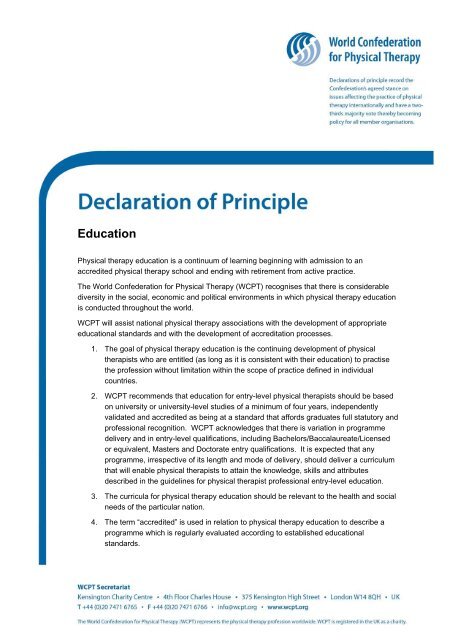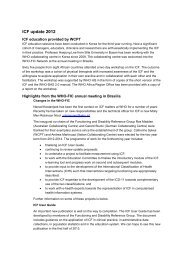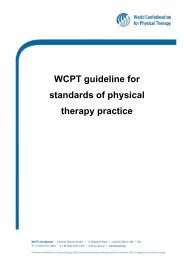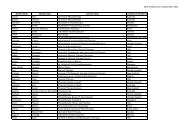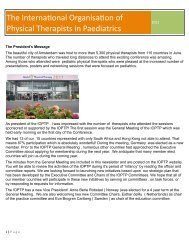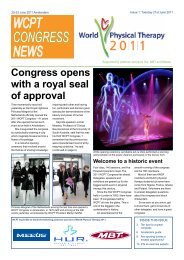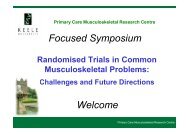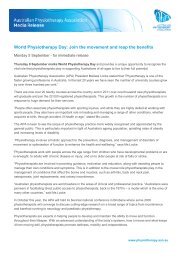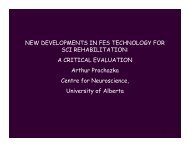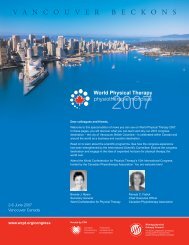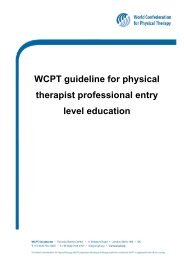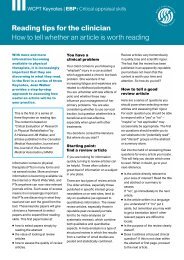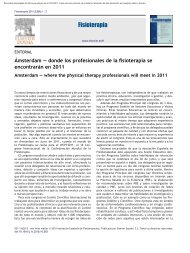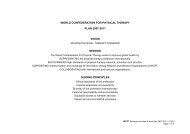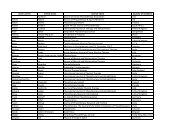Education - World Confederation for Physical Therapy
Education - World Confederation for Physical Therapy
Education - World Confederation for Physical Therapy
Create successful ePaper yourself
Turn your PDF publications into a flip-book with our unique Google optimized e-Paper software.
<strong>Education</strong><br />
<strong>Physical</strong> therapy education is a continuum of learning beginning with admission to an<br />
accredited physical therapy school and ending with retirement from active practice.<br />
The <strong>World</strong> <strong>Confederation</strong> <strong>for</strong> <strong>Physical</strong> <strong>Therapy</strong> (WCPT) recognises that there is considerable<br />
diversity in the social, economic and political environments in which physical therapy education<br />
is conducted throughout the world.<br />
WCPT will assist national physical therapy associations with the development of appropriate<br />
educational standards and with the development of accreditation processes.<br />
1. The goal of physical therapy education is the continuing development of physical<br />
therapists who are entitled (as long as it is consistent with their education) to practise<br />
the profession without limitation within the scope of practice defined in individual<br />
countries.<br />
2. WCPT recommends that education <strong>for</strong> entry-level physical therapists should be based<br />
on university or university-level studies of a minimum of four years, independently<br />
validated and accredited as being at a standard that af<strong>for</strong>ds graduates full statutory and<br />
professional recognition. WCPT acknowledges that there is variation in programme<br />
delivery and in entry-level qualifications, including Bachelors/Baccalaureate/Licensed<br />
or equivalent, Masters and Doctorate entry qualifications. It is expected that any<br />
programme, irrespective of its length and mode of delivery, should deliver a curriculum<br />
that will enable physical therapists to attain the knowledge, skills and attributes<br />
described in the guidelines <strong>for</strong> physical therapist professional entry-level education.<br />
3. The curricula <strong>for</strong> physical therapy education should be relevant to the health and social<br />
needs of the particular nation.<br />
4. The term “accredited” is used in relation to physical therapy education to describe a<br />
programme which is regularly evaluated according to established educational<br />
standards.
5. The first professional qualification should be completion of a curriculum that qualifies<br />
the physical therapist <strong>for</strong> practice as an independent autonomous professional.<br />
6. An integral component of the curriculum <strong>for</strong> the first professional qualification is direct<br />
clinical experience under the supervision of appropriately qualified physical therapists<br />
or other relevant health professionals. As skills and experience increase, this clinical<br />
education will involve access to gradually increasing levels of responsibility.<br />
7. The curriculum should equip physical therapists to practise in a variety of health care<br />
settings including, but not limited to, institutional, industrial, occupational and primary<br />
health care that encompass urban and rural communities. Consideration should also<br />
be given to preparing physical therapists to practise in environments that reflect the<br />
health care/service delivery models that operate in different countries.<br />
8. The curriculum and continuing professional development (CPD) opportunities should<br />
prepare physical therapists with a knowledge of educational approaches which will help<br />
them supervise, educate and transfer skills to others.<br />
9. <strong>Physical</strong> therapists should be equipped <strong>for</strong> evidence-based practice.<br />
10. Research methodology should be included in entry-level programmes.<br />
11. Professional physical therapy entry-level education should be conducted by physical<br />
therapists and other appropriately qualified educators. The educators should be able to<br />
transfer knowledge and skills about physical therapist examinations/assessment/<br />
evaluations, and interventions/treatment and their outcomes, including the critical<br />
analysis of theories and methods of physical therapy.<br />
12. Educators should have appropriate qualifications and/or experience in teaching and<br />
learning. They should also have an awareness and understanding of the culture in<br />
which they are teaching.<br />
13. Educators should include a variety of approaches to student assessment (eg, <strong>for</strong>mative<br />
and summative).<br />
14. Individuals with appropriate education and/or credentials should teach basic and<br />
foundational sciences (e.g., anatomy, histology, physiology, imaging, pharmacology),<br />
behavioural and social sciences (e.g., psychology, ethics, sociology), movement<br />
sciences (e.g., kinesiology, biomechanics, exercise science) and research<br />
methodology.<br />
15. The goals, content, <strong>for</strong>mat and evaluation of the education programmes provided <strong>for</strong><br />
physical therapists are the responsibility of the faculty but should involve the active<br />
participation of the national physical therapy association.<br />
16. Life-long learning and professional development is the hallmark of a competent<br />
physical therapist. It should be recognised that learning and development may take<br />
place in a variety of ways and is not limited to attendance at <strong>for</strong>mal courses.<br />
Page 2 of 3
17. <strong>Physical</strong> therapists should be encouraged to undertake post-graduate education in<br />
physical therapy or related fields which will advance their professional development.<br />
Date adopted:<br />
Originally adopted at the 13 th General Meeting of WCPT June 1995 and revised at the<br />
15 th General Meeting of WCPT June 2003. Revised 2007 to incorporate the Position<br />
Statement: <strong>Education</strong> <strong>for</strong> entry-Level physical therapists (1995) and adopted at the 16 th<br />
General Meeting of WCPT, June 2007.<br />
Date <strong>for</strong> review: 2011<br />
Related WCPT<br />
Policies:<br />
WCPT Guidelines <strong>for</strong> physical therapist entry-level education<br />
Position Statement: Description of <strong>Physical</strong> <strong>Therapy</strong><br />
Copyright © <strong>World</strong> <strong>Confederation</strong> <strong>for</strong> <strong>Physical</strong> <strong>Therapy</strong> 2007<br />
Page 3 of 3


